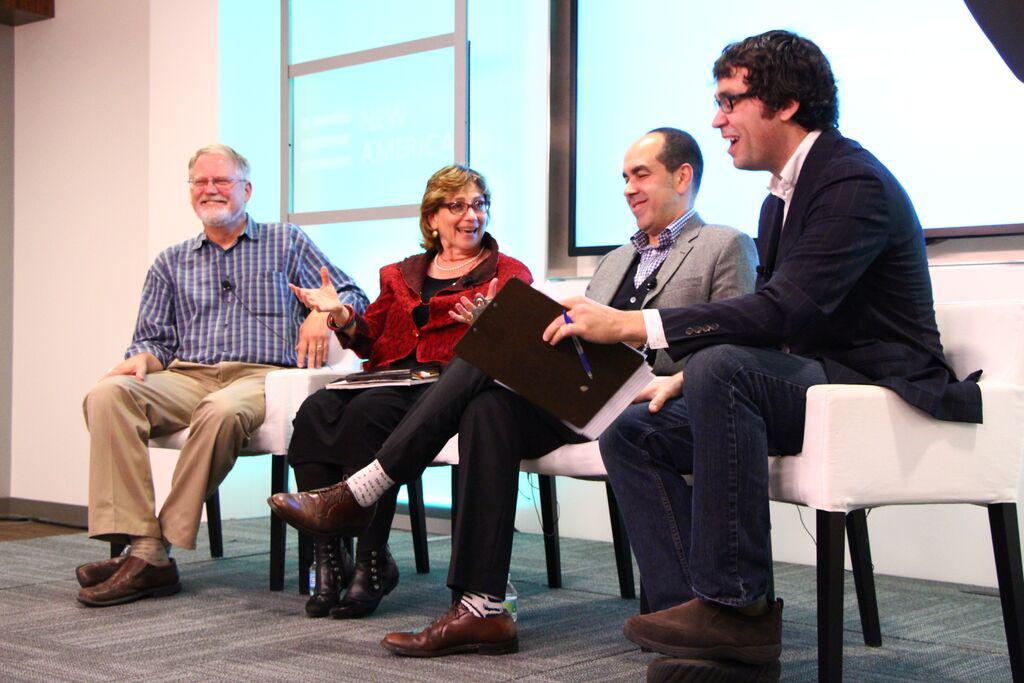A prophecy: By the year 2100, libraries will be both highly distributed and deeply connected, sharing a single collection as they work to meet the emerging demands of their individual communities.
This was the story that James O’Donnell, university librarian at Arizona State University, told at “Will Libraries Outlive Books?”, a Future Tense event held in Washington, D.C., on Nov. 12. It was also a story that O’Donnell and his fellow panelists would complicate and challenge over the course of a far-ranging dialog.
As the lexicographer Jesse Sheidlower, who kicked off the evening, observed, we tend to associate the term library with books. This connection makes it difficult to imagine an affirmative answer to the event’s titular question. But library isn’t etymologically related to books at all, deriving instead from a Latin word for the smooth inner bark of a tree. It was, in this sense, a thing on which one might write rather than a storehouse of what had already been written. Whatever they become, he proposed, libraries will retain that original implication, always “spaces for creation or curiosity,” even if they leave the books behind.
Provocative as this proposal sounds, most of the participants in the event agreed. During the first of the evening’s two panels, Deborah Jacobs, director of the Global Libraries Initiative at the Bill and Melinda Gates Foundation, remarked that it’s important not to lose ourselves in nostalgic ideas of what a library is or should be. (Disclosure: Deborah Jacobs is my mother.) Gesturing to the Aspen Institute’s recent report on public libraries, she insisted that we need to hold ourselves accountable for the institutions we fund by more actively engaging with them.
To Jacobs’ mind, this means spending time in libraries and learning more about the ways people actually take advantage of them. When we demand that libraries maintain print collections no one actually uses, we limit their ability to adapt and grow, potentially denying them a meaningful future in the process. Jacobs and her fellow panelists went on to argue that libraries should be in the business of meeting community needs, whatever those needs might entail.
Stressing the deep historical roots of this obligation, Richard Reyes-Gavilan, executive director of the D.C. Public Library, reminded the audience that the Carnegie libraries, thousands of which were built throughout the world starting in the late 19th century, were originally intended to give their patrons “a leg up,” not just to offer them something to read. But those long-standing commitments don’t mean that libraries can’t change with the times: As Miguel Figueroa, director of the Center for the Future of Libraries, noted, librarians are no longer in the business of prescribing the values of the communities they serve. Where they once furnished resources, their task today may have more to do with helping library users make sense of the plentiful materials already available to them.
Building on this line of thinking, Google’s Daniel M. Russell insisted that helping communities cultivate information literacy today will be key to the library of tomorrow. The more knowledge we have access to, the harder it becomes to sort through it. Helping people overcome this difficulty will count among the key tasks of librarians. This will be the case even if, as Elizabeth Merritt, director of the Center for the Future of Museums, warned, we lack the resources to sustain truly comprehensive collections in 100 years. If so—and perhaps even if not—it will be all the more urgent for librarians to become, as O’Donnell put it, something like Jedi knights, a combination of “wizards and coaches.”
Regardless, the spaces that librarians work out of will continue to shape the work they do, though they also need not limit themselves to traditional facilities. “There needs to be a boundless library that isn’t about the building at all,” Jacobs said. This captured a general sentiment that we must think broadly about what a library is or can be. Still, as Merritt suggested, there may be something seductive on a fundamentally human level about the grand spaces libraries sometimes occupy. More important, though, Russell proposed, may be their status as “a third place.” Neither home nor work, they serve as meeting grounds, venues for, in O’Donnell’s phrase, “collaboration, community, and even conspiracy.”
Predicting what libraries will be like in a century is difficult in part because it inevitably devolves into speculation about what people will be like in a century. Indeed, the panelists jointly hinted that the real task of libraries—now and later—is to help us forge our own futures. There is, in any case, no single future for libraries. They are, Figueroa observed, adaptive institutions, powerful precisely because they are never tied to a single trajectory.
